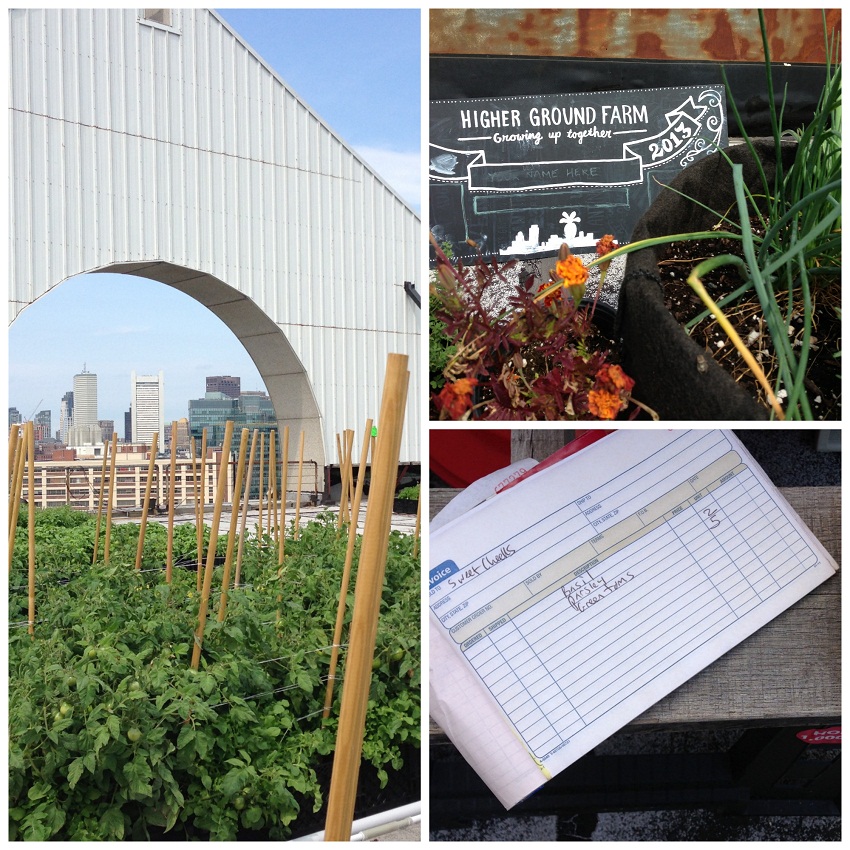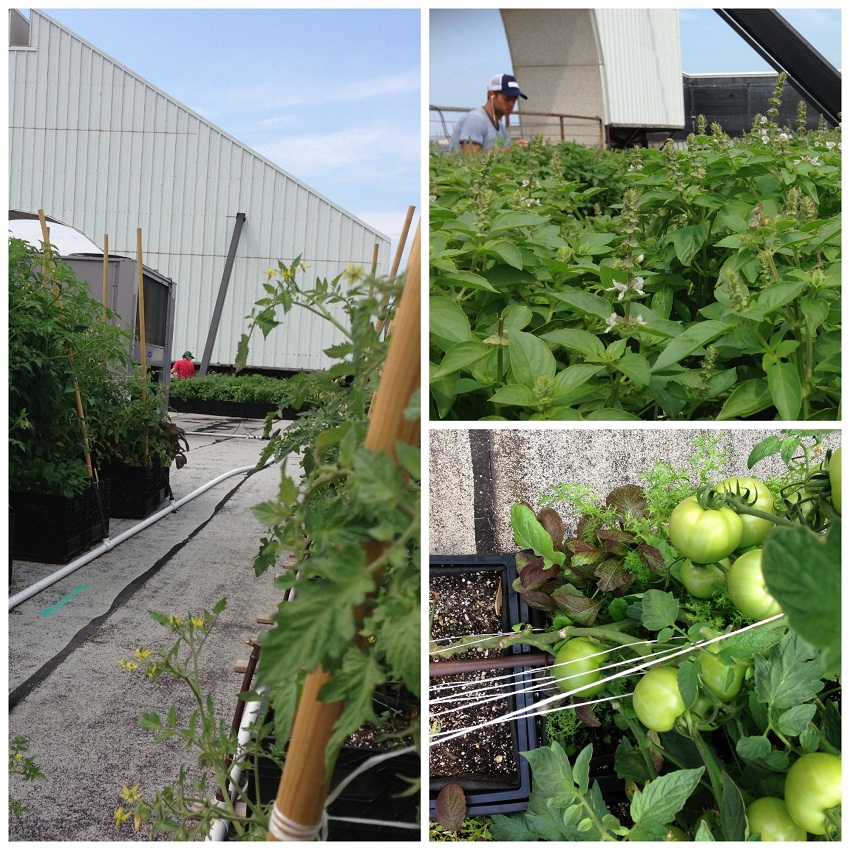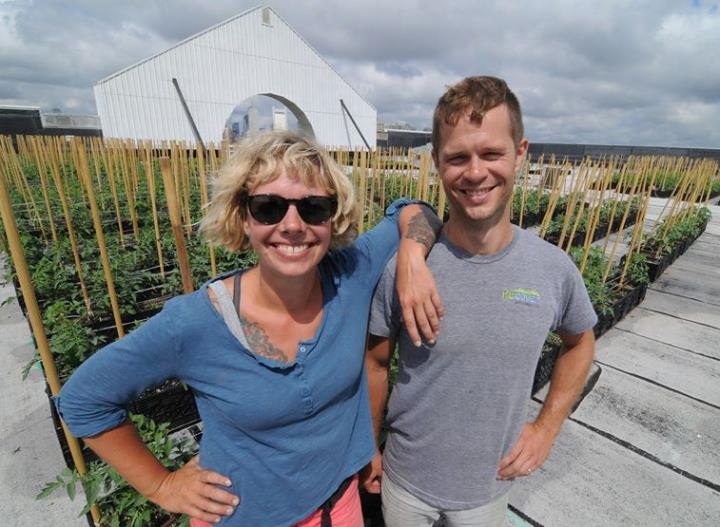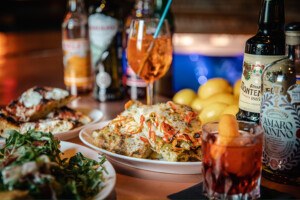Supply Chain: Up on the Roof with Higher Ground Farm
Welcome to Supply Chain, where we go behind the plate to get a feel for the day-to-day of Boston’s most relied-upon restaurant purveyors.
As I pass large, glassy showrooms packed with oriental rugs on my way to the Boston Design Center’s elevator bank, I wonder how many people in the building know there’s a precedent-busting grassroots farm sprouting nine floors above them. Even though I’m fully aware of where I’m headed, when I push open the door to the roof and am greeted by a large grid of lush plants, it still feels like I’ve stumbled upon some secret grow-op—of tomatoes, herbs, and delicate salad greens, that is.
This is Higher Ground Farm, the brainchild of Courtney Hennessey and John Stoddard, and from the looks of it, it’s a pretty sweet gig. The highly anticipated farm, which only began making deliveries midway through the summer, has already locked down some of the best restaurant clients in the city, and their end-of-summer haul is in full swing.
It’s just the two of them working up here, hollering back and forth over the white noise from the wind as they make their way through rows of planter boxes spilling over with herbs. As I make my way over to Hennessey, she’s smiling to herself, perched on a newly acquired gardening cart and peacefully clipping parsley.
“Our heads are literally down and working so much that we come up for air it’s like, holy shit, we actually did this,” she says. “That part still amazes me.”
The pair met their first week of college at the University of Vermont, where they were both majoring in Environmental Studies, and after graduation, their paths continued in a parallel vein. They both worked in the sustainable food industry in different capacities— Hennessey here in Massachusetts with The Food Project, and Stoddard in the healthcare industry in Portland, Oregon. When Stoddard eventually made his way back East, the seed of a collaborative idea took hold.
“On a conceptual scale, we like this type of farming because it makes use of a lot of unused urban space,” Stoddard says. “It’s also about growing food closer to where people live. Not only is it not traveling as far, you’re also able to tie people to food production, which we’ve become very separated from.”
It took the duo a little over two years to find this site, 60,000 square feet of open rooftop in South Boston, which they want to eventually develop into a fully functioning program with a greenhouse, CSA program, and farmer’s market presence.
“We had a specific number of criteria that we were looking for, the biggest one being it had to be a minimum of 25,000 square feet to make it cost-effective,” Hennessey explains. “We needed water access to the roof, we needed a parapet wall already installed, a landlord that was interested, the roof membrane needed to be in good shape… the Boston Design Center was the first one that fit the full bill.”
They signed a ten-year lease last fall, and spent last winter doing initial fundraising on Kickstarter to tremendous success, raising just shy of $24,000. The design in place at the moment—rows of modular planter boxes—is only a portion of the final design. Next year, these planters will be moved to the outer perimeter of the roof, and an entire green roof farm (real dirt and rows of vegetables) will be put down in the center.
“Our biggest challenge has been the wind. It was something we knew was going to be a factor, but it’s much more aggressive than we thought it would be,” Hennessey says, and Stoddard nods. “It’s been a really interesting part of figuring out ways to make sure the plants are stable and healthy and can continue to grow.”
Both of them are currently working multiple jobs while they get the farm up and running, and their big hope is for the business to support them fully within three to five years. “Farming is a tough business,” Stoddard says. “I think it’s a little untested as far as whether or not people can grow food as a business in a city and sustain it that way. It’s an experiment to see how it will actually work.”
Michael Serpa of Neptune Oyster has known Stoddard and Hennessey for years, and has been a staunch supporter since day one. He currently uses Higher Ground greens and herbs on his menu. “When they started talking about the farm and looking for a location I was all about it,” he says. “These kinds of projects are necessary to keep Boston innovative, creative, and generally fun. Boston is a very expensive place to live, and doing projects like this is a big financial risk. If the city wants to promote more creative urban projects and independent business and restaurants, it needs to help level the playing field.” Including them on Neptune’s list of purveyors was an easy decision for Serpa, who says it never hurts to know the people who are growing your product well. Plus, he adds, “They’re awesome.”
Before they head back out to continue the afternoon’s harvest, storm clouds broiling overhead, Hennessey recalls getting a text from a coworker a few weeks after they had begun deliveries. “We had delivered the previous morning, all over the South End, and I woke up and a text had come in after I’d fallen asleep that said, ‘Eating dinner at Franklin South End,’ with a picture of the menu where it said ‘Higher Ground Farm Arugula,’” she says, a contagious smile spreading across her face. “We harvested and delivered it that morning, it was in that chef’s hand by 4 p.m., and my friend is eating it at midnight. It’s crazy.”





